In most conversations about universal reconciliation, a handful of verses are frequently cited as proof texts for the existence of an eternal hell. However, in this article, we aim to provide an alternative understanding of these verses from a universalist perspective. It is important to note that different universalists may interpret these verses in varying ways, and this article presents my understanding of these verses, based on the Bible, the Greek text, and the beliefs of some of the greatest church fathers. While this is not an exhaustive exegesis of each verse, it offers a concise overview to challenge prevailing notions of eternal punishment and encourage deeper exploration of these scriptural passages.
Jesus’ warnings of fiery hell (Matt 5:22; 18:9; 23:33; Mark 9:43; 12:5)
One common claim is that Jesus talked a lot about hell. This is a simplified statement because the word hell does not exist in biblical Greek. Jesus mentioned many different concepts (i.e., Gehenna, Hades, fire), which all have different meanings. But these different words and concepts are all lumped into the modern word hell. The context of the words is often not studied, and the modern idea of an eternal hell is read into these concepts.
Let’s look a little closer at one verse on the list: Mark 9,43–45 (NET)
If your hand causes you to sin, cut it off! It is better for you to enter into life crippled than to have two hands and go into hell, to the unquenchable fire. If your foot causes you to sin, cut it off! It is better to enter life lame than to have two feet and be thrown into hell.
When interpreting any biblical passage, it is important to consider its immediate context as well as the broader context of the entire Bible. This passage uses strong and exaggerated language, employing hyperbole to emphasize the seriousness of sin.
Jesus speaks about cutting off one’s hand or foot or gouging out one’s eye if it causes one to sin. The verse is part of a vivid and metaphorical teaching on the seriousness of sin and its consequences. Jesus often used vivid imagery and strong language to make his teachings memorable and impactful.
All Christians understand that these verses employ metaphorical language, but they read it literally when it comes to the hell part. I suggest we should take the literary genre seriously and consequently read the hell part as metaphorical language as well. This makes a lot of sense when considering the Greek word used in all the verses mentioned above.
In all the verses above, the Greek word translated as hell is Gehenna (γέεννα). Gehenna is a real place that you can visit today. You can even check it out in Google Maps. Gehenna has a rich history in the Old Testament (OT). The only way to correctly understand the words of Jesus is by reviewing what the OT says about Gehenna.
Gehenna is a transliteration of the Valley of the Sons of Hinnom. For Jews, Gehenna/Hinnom was associated with sin and judgment because it was the place where King Ahaz (2 Ch 28:3) and King Manasseh (2 Ch 33:6) burned their sons as a sacrifice for Moloch.
Especially, Jeremiah and Isaiah coined the understanding of Gehenna in the OT. In their writings, Gehenna is a place of slaughter (Jer 7:31-32; 19:6+11-14 – note: Topheth is a place in the Valley of Hinnom) and fire (Is 30:33). Thereby, Hinnom became a place of fiery judgment. It was the place where the dead Israelites were pilled after the Babylonians had conquered Jerusalem (Jer 7:31-33; 19:2-13). But in the whole OT, it’s never associated with eternal judgment in the afterlife but with imminent judgment in this world (e.g., the destruction of Jerusalem through the Babylonians).
Jesus associates Gehenna with unquenchable fire (Mark 9:47-48). What did the Jews associate with unquenchable fire? In the OT, we find many references to unquenchable fire. For example, the Babylonians burned Jerusalem with unquenchable fire (Jer 21:10-12). When Ezekiel prophesied the coming of the Babylonians he said that the whole Negev (southern portion of Israel) would be scorched by unquenchable fire (Ez 20:47-48). Amos speaks of unquenchable fire as a national judgment on the northern kingdom at the hands of the Assyrians (Amos 5:5-6). Isaiah used it to describe the national judgment on Edom (Is 34:10). Is any of all these places burning until today? Obviously not! Unquenchable fire had nothing to do with eternal punishment but was all about imminent national judgment in this world.
All of this was probably in the heads of the Jews who listened to Jesus. So, when Jesus used terms like Gehenna and unquenchable fire, the idea of eternal punishment most likely never crossed their head. Instead, they likely remembered the horrors of the destruction of Jerusalem at the hands of the Babylonians. And I think that’s precisely what Jesus wanted to communicate. His message was not that the unrepentant will eternally be punished in hell. His message was: if you Israelites won’t repent and follow my way of love, then the same will happen to you again as when Jerusalem was destroyed the first time.
Sure enough, the Israelites didn’t repent or follow Jesus’ teaching. They chose the way of violence and rebellion, and exactly what Jesus prophesied happened: in 70 AD, the Romans destroyed Jerusalem and burned it down, and Josephus indicates that all the dead bodies were thrown in the valley of Hinnom.
The parable of the sheep and the goats (Matt 25:31-46)
Jesus’ parable of the sheep and the goats is often cited as the key verse for the idea that there is an eternal hell. But looking at the verses closely, and not just reading them superficially, will show that this is not the case. In fact, the opposite is true: the verses give hope for a future reconciliation of all people with Jesus.
And these will depart into eternal punishment, but the righteous into eternal life.
Matt 25:46 (NET)
Please read our detailed article about the parable for more details on understanding this parable and the verse correctly.
In a nutshell: the Greek words here are aionios (eternal) and kolasis (punishment).
Translating aionios is difficult. Its precise meaning depends on the context in which it is used!!! The word aionios is derived from “aion,” which refers to an “age” or a “period of time.” The term aionios is an adjective related to aion and reflects the quality or characteristics of that particular age or period. The word does not inherently indicate an infinite duration, but rather a duration that is specific to the context it is used in. It likely is best translated as age-lasting.
If the context of aionios is God, it can mean eternal because God is eternal. But if the context changes, the length of the described time changes too. Therefore, we need to look at what kolasis means.
In the New Testament, there is a Greek word for “retributive punishment”: timōria. This word was deliberately not used here in verse 46. Kolasis was originally used for pruning trees so that they would bear more fruit. Kolasis was thus a punishment imposed in the interest of the one to be punished.
Kolasis, then, was a restorative punishment. The punishment itself was not the goal, but the means to bring about restoration. Can such a punishment last forever? No, because then it would be a retributive and not a restorative punishment. This verse is about an age-long (aionios) punishment (kolasis) with a purifying and restorative character. How long this process will last, we do not know. But it will have an end when the goal is reached. This fits perfectly with the big picture of the Bible, which portrays God’s justice as being restorative and not retributive.
Does this mean that eternal life is also limited? No, it doesn’t. As mentioned above, the length of aionios depends on the word that characterizes it. A restorative punishment, by definition, cannot be eternal because then it would not be rehabilitative. But the life God gives is eternal because it comes from God, who is eternal.
We find the same construction (= aionios appearing twice in one sentence and once meaning eternal and once meaning a limited time) as in Mt 25:46 two more times in the New Testament: Rom 16:25-26 and Titus 1:2.
The rich man and the poor Lazarus (Luke 16:19-31)
This parable cannot be used as a definitive proof text for an eternal hell when considered in light of its context and the genre of parables.
Parables are a unique genre of storytelling used by Jesus to convey spiritual truths and moral lessons. They employ metaphorical language, symbolism, and vivid imagery to illustrate specific points. As such, they should not be interpreted as literal descriptions of the afterlife or precise theological doctrines. Reading parables in an overly literal manner can cause many theological problems.
If we read this parable as a report on the details of the afterlife, then we run into five big difficulties.
- Because it contradicts the teaching of the Old Testament.
- Because it ignores the context of the chapter.
- Because it undermines that salvation is through faith in Jesus Christ alone.
- Because it contradicts Romans 11:26.
- Because it portrays a hideous vision of heaven.
Our detailed article about the Lazarus parable explores every point in more detail.
Therefore, the nature of the parable does not allow it to be taken as an actual detailed description of the afterlife.
The parable of the rich man and Lazarus appears in a series of parables found in Luke 16, where Jesus addresses the Pharisees and religious leaders. The primary focus of this section is the theme of proper use of wealth, social justice, and the need for repentance. The parable is part of Jesus’ teaching on the dangers of wealth and the importance of caring for the poor and should be interpreted in that light without reading pagan ideas of eternal torture into the text.
The lake of fire (Revelation 21)
But as for the cowards, unbelievers, detestable persons, murderers, the sexually immoral, and those who practice magic spells, idol worshipers, and all those who lie, their place will be in the lake that burns with fire and sulfur.
Revelation 21:8 (NET)
This verse is an all-time favorite of infernalists to prove the existence of an eternal hell. But this conclusion is problematic for several reasons.
The book of Revelation belongs to the genre of apocalyptic literature, which is highly symbolic and metaphorical. It employs vivid imagery and symbolic language to convey profound spiritual truths. As such, interpreting the lake of fire as a literal representation of an eternal hell may oversimplify the intended symbolism of the text.
Throughout the Bible, fire is often used as a symbol of purification, refining, and judgment. The lake of fire should be understood symbolically as representing God’s refining and purifying judgment upon evil and sin, rather than a literal eternal place of torment. The purpose of such symbolic language is to convey the severity of God’s judgment and the transformative power of His purifying work.
The lake of fire is not the end of Revelation. The book of Revelation culminates in the vision of a new heaven and a new earth, where God dwells with His people in perfect harmony. The emphasis is on restoration, redemption, and the renewal of ALL THINGS (Revelation 21:5). It is the time of the restoration of ALL THINGS (Acts 3:21). This overarching theme suggests a hopeful and inclusive vision of God’s ultimate plan, where He extends an invitation for all to enter His kingdom (Rev 22:17) and partake in the new creation.
In Revelation 21, it is notable that after the sinners are thrown into the lake of fire, they are suddenly out of the fire and found outside the New Jerusalem (Rev 22:15). God’s mercy never comes to an end, the gates of the new Jerusalem are always open (Rev 21:25), and people are invited to come in and experience God’s presence (Rev 22:17). This imagery aligns with the broader biblical teachings of God’s unending love, mercy, and desire for the salvation of all. It suggests that God ultimately will redeem his whole creation.
This understanding of the Lake of Fire is precisely how the greatest and earliest church fathers have interpreted it. They proclaimed that God is a consuming fire. He consumes evil, sin, injustice, and darkness. But his fire is purifying because his justice is restorative and not vengeful. The great church fathers understood the lake of fire as God’s restorative and purifying judgment.
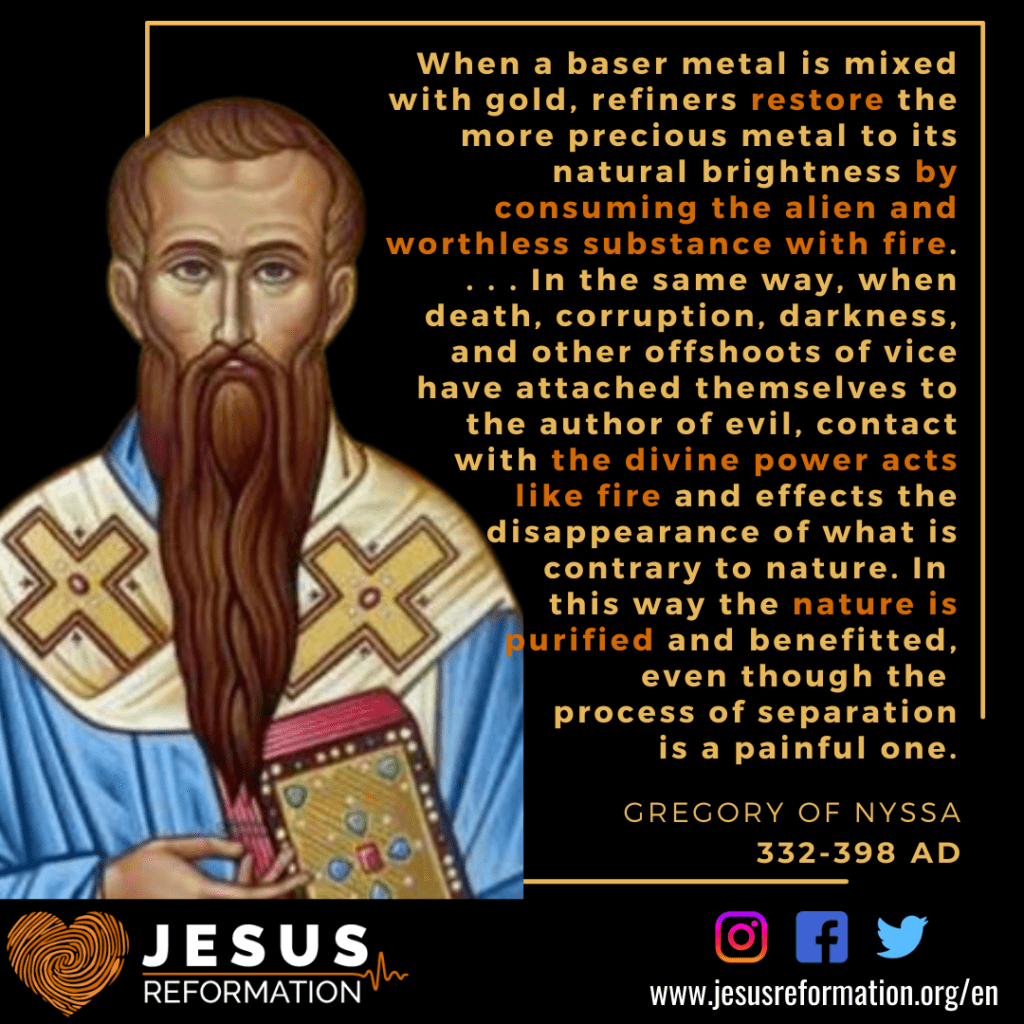
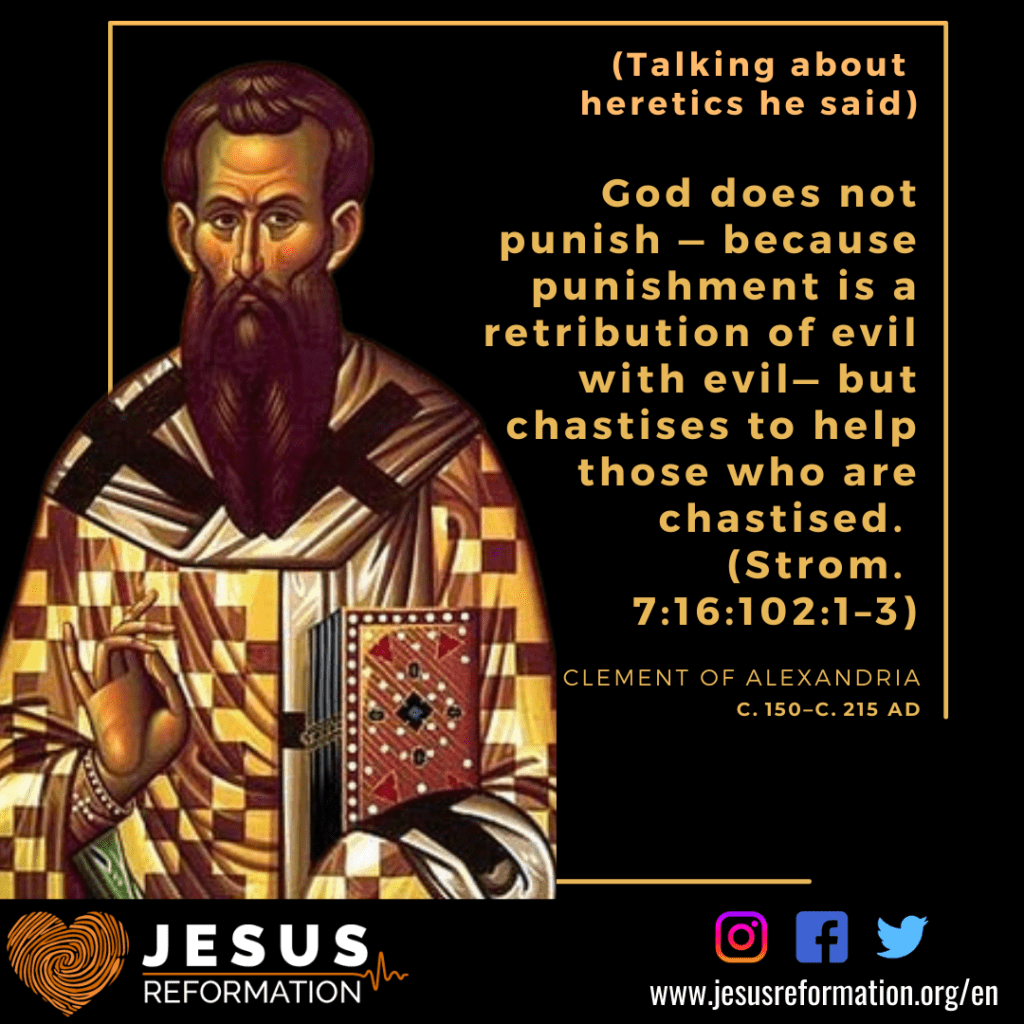
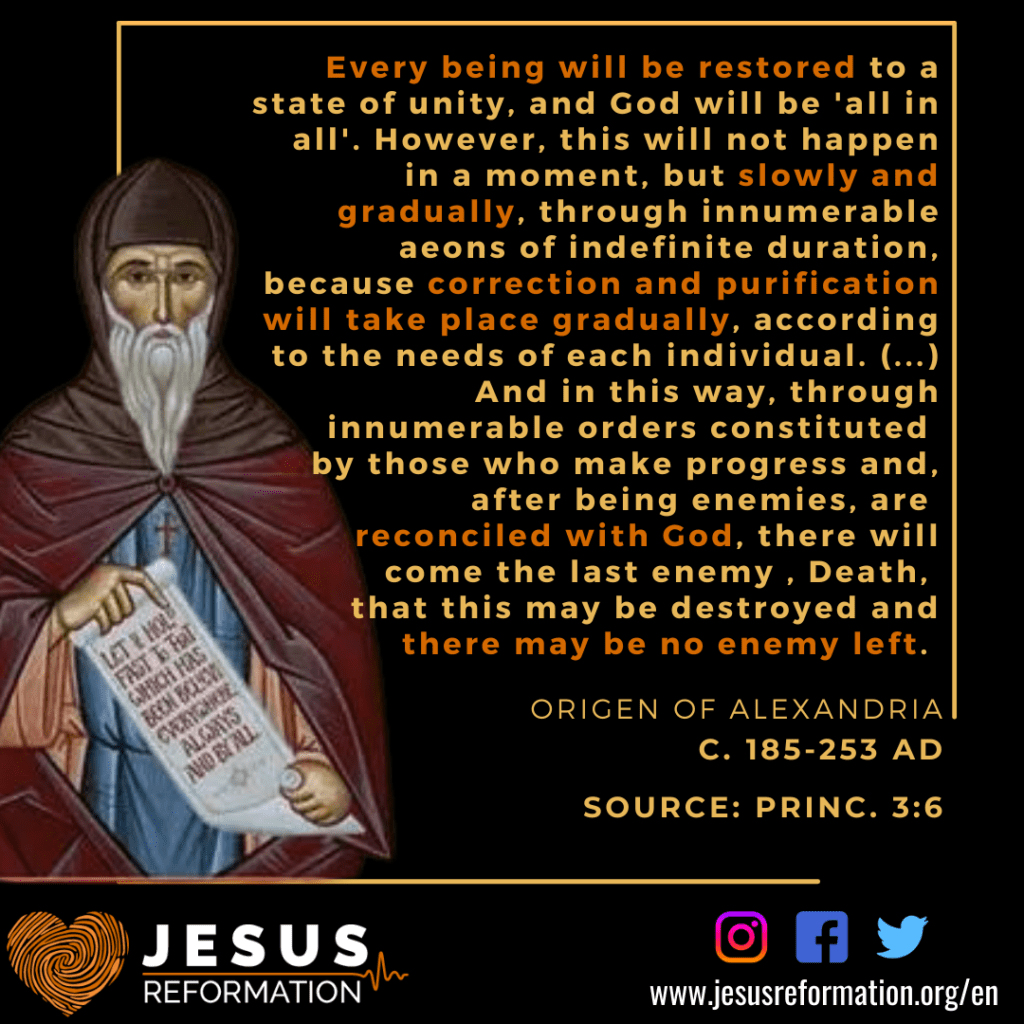
The book of Revelation testifies to the eternal truth that, ultimately, God will have his way. He will defeat all evil and abolish all injustice, death, and sin. But he will not do it by force, torture, or violence. However, he will win his creation back by judging with truth and love, leading to the reconciliation and restoration of all things.
…and then judgment (Hebr 9:27)
And just as people are appointed to die once, and then to face judgment, …
Hebrews 9,27 (NET)
One of the biggest misunderstandings about universal reconciliation is the mistaken belief that it entails an automatic entry into heaven without any form of judgment. This form of universalism is indeed flawed theology, as it promotes injustice and overlooks essential biblical themes. The Bible is clear that God will judge every individual, emphasizing the certainty of judgment. Hebrews 9:27 affirms the reality of judgment but does not imply that people cannot repent after death. Many Christians derive the notion that repentance is impossible in the afterlife solely from this verse, which is an erroneous interpretation. What the verse states is that judgment will occur. Biblical universalists affirm this reality but believe that God’s judgment is restorative rather than vengeful. God will save people through a process of judgment in the afterlife, demonstrating that his mercy truly never comes to an end.
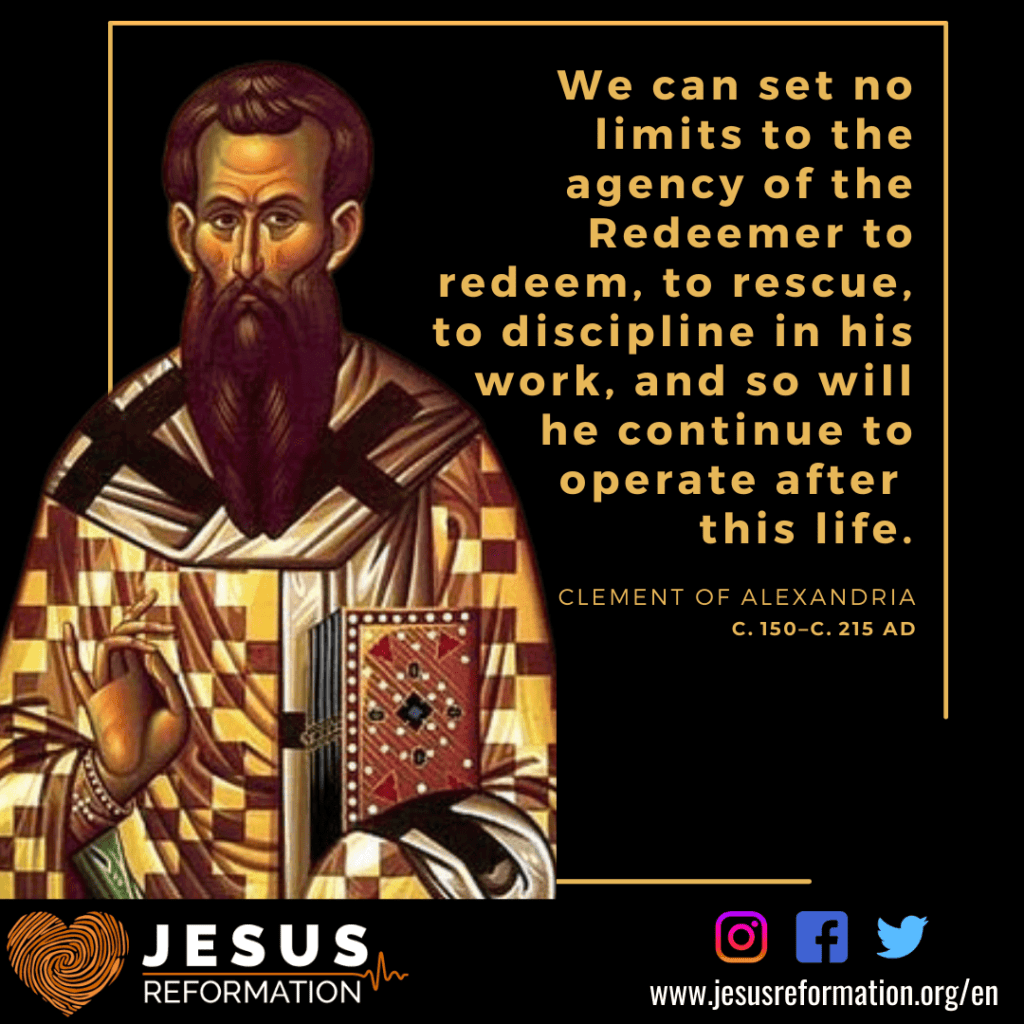
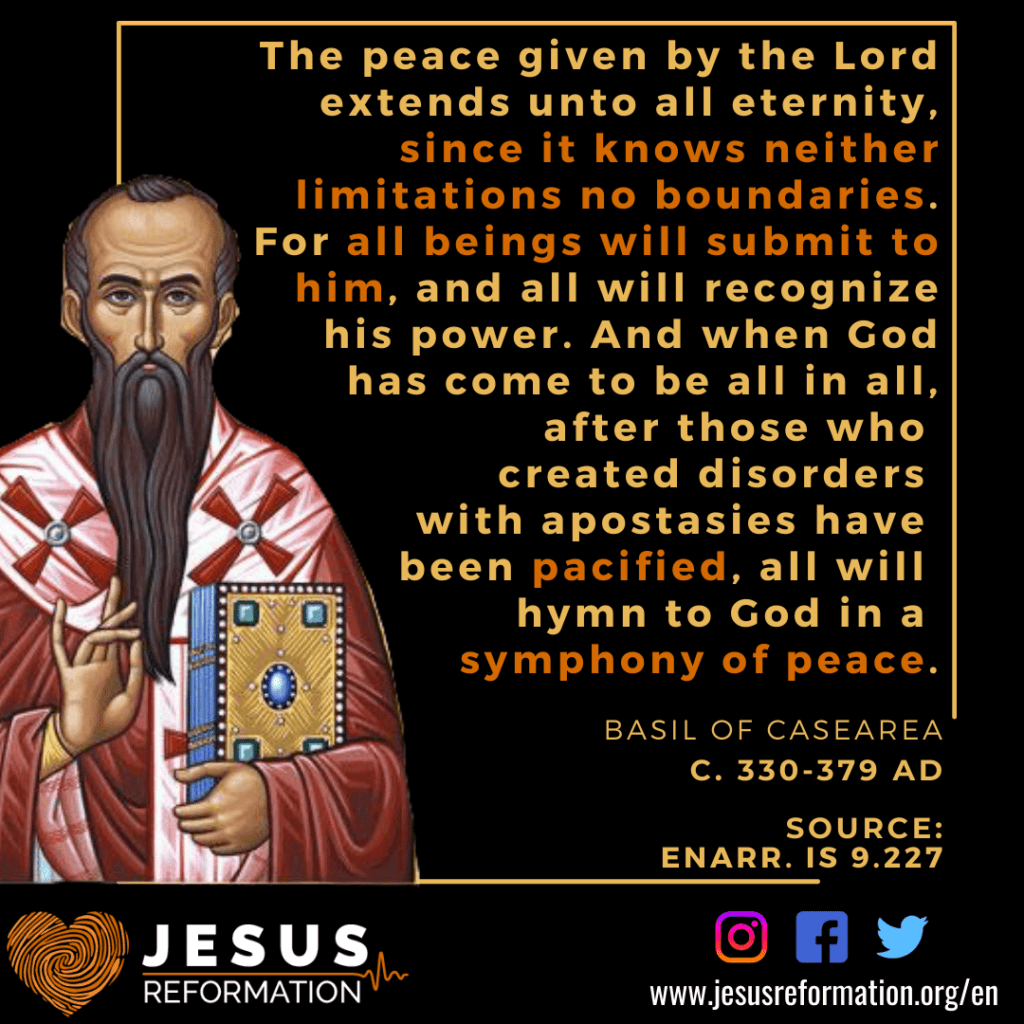
Many of the great church fathers believed that during His death, Jesus descended to Hades and proclaimed the message of salvation, as depicted in 1 Peter 3:19. This verse implies the possibility of salvation after death, highlighting that God’s love and mercy extend beyond the boundaries of earthly life, contrary to the beliefs of some Christians who place limitations on God’s boundless love.
The narrow gate (Matt 7:13)
Enter through the narrow gate, because the gate is wide and the way is spacious that leads to destruction, and there are many who enter through it.
Matt 7:13 (NET)
The crucial question for interpreting this passage is whether Jesus was making a statement about what happens in the afterlife or addressing a process in this world. To answer this, we must consider a few things.
The verbs in the verse (in Greek) are all in the present tense, which gives the impression of immediacy. When Jesus spoke of the kingdom of God, he was conveying that the kingdom of God is breaking into this time and has already begun in this world, although many do not realize it. His message was, “Now is the time, God’s kingdom is at hand.” (Mark 1:15).
Note that the word translated as “destruction” (Greek: apōleia; a form from the root word: apollymi) does not necessarily indicate final destruction. Jesus tells in Luke 15 of three things that are lost (Greek: apollymi): a lost coin, a lost sheep, and the prodigal son. All three of them are lost, and are in a state of “destruction” until they are found! All three are rescued from destruction and restored.
What was Jesus trying to say? Did he mean to say that only a few people are saved, but many are on their way to eternal hell? I think such an interpretation would not do justice to the text. I think Jesus was urging his listeners (“Enter the narrow gate!”) to put his kingdom first (Matt 6:33). Only the way of Jesus brings true life. All attempts to find true life outside of Jesus will eventually fail (Luke 15:11-32) and end in ruin. But just as the prodigal son was not eternally lost (in perdition), no one need remain eternally lost. God will find all His lost children, rescue them from their path of destruction and restore them.
Eternal destruction (2 Thess 1:8-9)
With flaming fire he will mete out punishment on those who do not know God and do not obey the gospel of our Lord Jesus. They will undergo the penalty of eternal destruction, away from the presence of the Lord and from the glory of his strength, …
2 Thess 1:8-9 (NET)
What does eternal (aionios) destruction (olethros) mean here in this verse?
We have talked about “aionios” already. It is often mistakenly translated as “eternal” or “everlasting.” However, it carries the sense of an age-lasting duration rather than an infinite time. In numerous instances throughout the New Testament, “aionios” refers to a period with a definite beginning and end, related to a specific age or era. Thus, it is appropriate to interpret “aionios” in 2 Thessalonians 1:8-9 as “age-lasting” rather than “eternal.”
The Greek word “olethros,” translated as destruction, appears in 1 Corinthians 5:5. In this passage, it is used in the context of church discipline to bring about restoration and repentance of a sinner. The goal is not ultimate destruction but the salvation and reconciliation of the individual. This demonstrates that “olethros” implies a process of corrective punishment aimed at restoring the individual rather than annihilating them.
When examining the immediate context of 2 Thessalonians 1:8-9, the passage emphasizes the righteous judgment of God upon those who oppose the gospel and persecute believers. While the language used depicts punishment and fiery retribution, the goal is not perpetual suffering but a correction leading to repentance and restoration. This interpretation maintains consistency with the biblical themes of God’s justice, mercy, and desire for reconciliation.
To learn more about God’s restorative justice, please read our poem about his restorative judgment.
Sinners can’t enter the kingdom of God (Matt 10:33; Gal 5:21)
Those who practice such things will not inherit the kingdom of God!
Galatians 5:21 (NET)
To understand verses like this, we first need to understand one important principle that we find in many verses: only people with hearts fully surrendered to Jesus can enter the kingdom of God.
Why? Because if you let wolves enter the sheep pen, then it won’t be very peaceful in the sheep pen. God is ruling through love (which doesn’t override free will) and will do the same in his future kingdom. He won’t control or manipulate us; therefore, he needs to know that the people who enter his kingdom are truly surrendered to him and his way of love. Not fully surrendered hearts would reintroduce sin and suffering in God’s future kingdom.
Hence, it follows that only those who wholeheartedly surrender to God and embrace His path of love will have access to the forthcoming kingdom of God. This logical conclusion stems from the understanding that a kingdom is defined by the realm where a king’s rule is established, implying that the kingdom of God can only be entered through submission to God and his way of love.
People who still cling to sin and don’t surrender to the lordship of Jesus can’t enter the kingdom of God. This is affirmed in countless verses throughout the New Testament:
1 Cor 6:9-10; Gal 5:19-21; Eph 5:5; Rev 22:15
How can we now reconcile that sinners can’t enter the kingdom with verses that claim that ultimately God will reconcile the whole cosmos back to him?
Sinners can’t enter the kingdom as long as they are sinners. In 1 Cor 6:9-10, Paul boldly proclaims that sinners (idolaters, adulterers, greedy…) “will not inherit the kingdom of God.” But right in the next verse, he is saying, “Some of you once lived that way” (1 Cor 6:11, NET). His audience used to be sinners like that. They followed the way of selfishness and rebelled against God’s way of love. At that time, they couldn’t enter the kingdom of God. But now they surrendered to Jesus. They repented from sin and live under the lordship of Jesus. Now they are part of the kingdom.
The principle is clear: as long as people rebel against God and his way of love, they can’t enter the kingdom, but whoever repents and submits to the lordship of Jesus can enter the kingdom.
Moreover, this principle applies to Matt 10:33.
But whoever denies me before people, I will deny him also before my Father in heaven.
Matt 10:33 (NET)
As long as people deny Christ, they will be denied by him. All those who resist Christ won’t be able to enter the kingdom, so Christ needs to deny them. But this is only true until they repent and submit to his lordship. Example: Peter denied Jesus three times. That doesn’t mean that Jesus will deny Peter eternally.
The grammar in this verse affirms this reading.
The tense of the verb deny “implies an ongoing action which triggers an ongoing response. The Concordant Literal Version does a good job capturing this ongoing sense. It reads, “Yet, who should ever be disowning Me in front of men, I also will be disowning him in front of My Father Who is in the heavens.” In other words, as long as someone is denying Jesus, Jesus is denying them before the Father. And the reverse is also true. Once someone stops denying Jesus, Jesus stops denying them before the Father”.
(David Artman, Grace saves all, 2020:Being disowned).
Everlasting abhorrence (Daniel 12:2)
Many of those who sleep in the dusty ground will awake—some to everlasting life, and others to shame and everlasting abhorrence.
Daniel 12:2 (NET)
Daniel 12:2 is usually the only passage in the Old Testament that some have interpreted to teach the concept of an eternal hell. However, a closer examination of the text within the framework of Old Testament theology on the afterlife reveals a different understanding. By exploring the historical and cultural context of the Old Testament, we can shed light on the true meaning of this passage and its implications for our understanding of the afterlife.
In the Old Testament, the concept of the afterlife was not clearly defined. Early Israelite beliefs centered on Sheol, a realm of the dead where all righteous and wicked departed souls resided. Sheol was not seen as a place of punishment or reward, but rather a shadowy existence devoid of the joys of life. The Israelites primarily focused on the present life and the blessings or curses they experienced in this world as a consequence of their actions.
The book of Daniel is one of the youngest books in the Old Testament. It introduces unique concepts regarding the afterlife that seem to have emerged during the intertestamental period, distinguishing it from the majority of Old Testament writings.
During the intertestamental period, there was a noticeable development of Jewish thought concerning the afterlife. Intertestamental writings, including those found in the Apocrypha and Pseudepigrapha, shed light on the evolving beliefs during this period. These texts, which circulated among Jewish communities, expressed new ideas about the afterlife, including the notions of resurrection, judgment, and reward or punishment based on one’s deeds.
The phrase “everlasting life” in Daniel 12:2 has often been understood to imply eternal bliss, while “everlasting contempt” has been associated with eternal punishment. But it must be noted that the Hebrew term (olam) for “everlasting” does not necessarily imply an infinite duration in the strictest sense, but rather a long-lasting, age-lasting period (just like the Greek word aionios). A more literal translation of the verse is:
‘And the multitude of those sleeping in the dust of the ground do awake, some to life age-during, and some to reproaches—to abhorrence age-during.
Daniel 12:2 (Young’s Literal Translation)
The book of Daniel is apocalyptic literature (just like Revelation), employing symbolic language to convey its message. It is essential to consider the symbolic nature of the imagery used in the passage. Consequently, it should not be interpreted in a literal way, but should be understood metaphorically and in accordance with the bigger picture of the Bible.
Throughout the Old Testament, God is portrayed as compassionate, merciful, and desiring the repentance and redemption of His people. This understanding aligns with the idea that God’s judgment is restorative, aimed at bringing about restoration rather than eternal punishment.
A final remark
This brief attempt to explain the most common verses used as proof texts for an eternal hell certainly doesn’t answer all questions. And while I firmly believe that God will save all people in the end, I do understand why devout Christians come to other conclusions. In my first 20 years as a Christian, I was convinced that an eternal hell exists; I looked down on universalists and boldly preached hell. I understand everyone who sees universal reconciliation as a heresy because I did for many years. But studying the Bible more thoroughly on the topic changed my mind.
The question of whether an eternal hell exists or whether God will save all people in the end is a complex matter. Both sides of the debate rely on the Bible for their argumentation and share a genuine love for God and a desire to understand His word. It is important to recognize that this topic is not easily settled and requires a careful and diligent study of the Scriptures.
Many devoted scholars and theologians have dedicated much time to studying this topic, and they often reach different conclusions. This highlights the challenges and complexities involved in interpreting the relevant biblical texts that touch on judgment, salvation, and the afterlife.
The Bible contains various passages that can be understood as supporting either the concept of eternal hell or the possibility of universal salvation. Many Christians look at the same verses but come to differing conclusions, showing that it is often primarily a matter of hermeneutics.
A genuine and sincere study of this topic should lead us to approach this topic with humility. We should avoid making simplified claims that the Bible CLEARLY teaches one doctrine over the other, as such assertions show ignorance of the whole topic and don’t do justice to the variety of views. We can only grasp the complexity and diversity of biblical teachings on the subject by listening to each other. Likewise, we should strive to engage in respectful and open-minded dialogue, acknowledging the genuine faith and scholarship of those with differing views.
Adopting a humble and Christlike attitude is essential when discussing this topic. It means approaching the study and discussion with a genuine desire to seek truth, to learn from one another, and to grow in our understanding of God’s character and plan for humanity. It means prioritizing loving your neighbor over defending the right beliefs, treating others with respect, and recognizing that faithful and sincere believers can interpret the Bible differently on this issue.
In conclusion, the question of an eternal hell and universal salvation is a challenging and nuanced theological topic. Both sides of the debate rely on the Bible, and sincere scholars and theologians can come to different conclusions. Approaching this discussion with humility, respect, and a Christlike attitude is crucial, as it allows for a genuine exploration of the topic while maintaining unity and love within the body of believers.

Leave a Reply